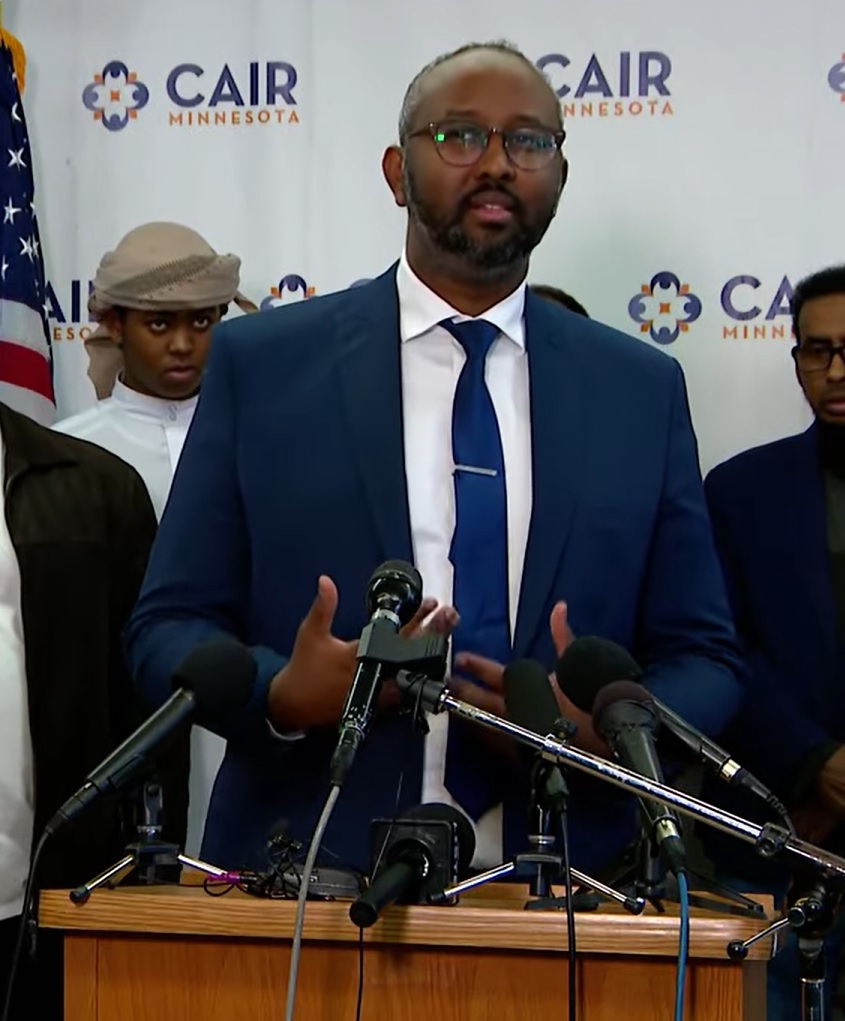Jaylani Hussein, the executive director of the Minnesota Chapter of the Council on American-Islamic Relations (CAIR), has good reason to feel jittery. After coming to the defense of Fayneese Miller, the president of Hamline University, who was subsequently asked to resign for bungling a controversy over academic freedom at the school, Hussein is finding himself at odds with officials at CAIR’s headquarters in Washington, D.C.
Muslims all over the world will protest.
Jaylani Hussein
Hussein accused a local professor of “Islamophobia” and hate speech for having shown Muslim-drawn pictures of Mohammad from the Middle Ages to her students in an art history class in October 2022, but CAIR national officials say the professor is guilty of no such thing. To make matters worse for Hussein, his name appears several times in a lawsuit filed against the school by the accused professor — and not in a good way.
The brief portrays Hussein as bullying Hamline professors by obliquely suggesting at a campus meeting on Dec. 8, 2022 (which was recorded on video) that if they don’t submit to the “Islamophobia” Regime he was trying to enforce, the school could be the scene of violence similar to what was endured by staffers at Charlie Hebdo magazine in Paris in 2015 who were murdered by jihadists angry over the publication of insulting pictures of Muhammad. Raising the specter of jihadist violence against a Methodist-affiliated liberal arts school in Minnesota is not a good look for a so-called civil rights organization in the United States. (“Nice school you got here; it would be a shame if anything were to happen to it.”) No wonder CAIR’s leaders in Washington, D.C. distanced themselves from Hussein’s messaging.
The controversy began late last October when Aram Wedatalla, president of the Muslim Student Association (MSA) at Hamline University, complained of the trauma she endured when adjunct professor Erika López Prater displayed reverential pictures of Muhammad over Zoom to her students. Prater had informed her students at the beginning of the semester — in the syllabus — that she would be displaying the images and that students who might be offended by their display did not have to view them. She offered the same warning the day the images were shown in class, to no avail.
Wedatalla complained to the school’s administration which subsequently withdrew an offer of a contract for Prater López to teach at the school the next semester. Moreover, one Hamline administrator declared that Prater’s actions were “undeniably inconsiderate, disrespectful and Islamophobic.” The Hamline Oracle, the school’s newspaper, published — and then removed — an article defending Prater from its website because of the “harm” it caused to Muslims at Hamline.
Wedatalla’s complaint, so redolent of the accusations of witchcraft that cost numerous innocents their lives in Salem in the 1600s, initiated a process by which a well-respected professor was rendered a pariah. According to the legal brief filed on her behalf, faculty members in Hamline’s art history department “stopped reaching out to her and seemed to be avoiding her” after administrator’s told them to stop talking about the controversy.
It took a while, but eventually, the pushback came in full force as numerous organizations including the Foundation for Individual Rights and Freedom (FIRE), the writers group, PEN America, and the American Association of University Professors (AAUP) excoriated Hamline administrators for their failure to protect the principles of academic freedom at the school. The mainstream press, even the New York Times, piled on as well. It helped that López Prater was no counter-Islamist culture warrior, having established her obeisance to the Diversity, Equity and Inclusion (DEI) regime governing higher education by offering numerous trigger warnings before showing the images to her students.
As it turns out, both Hussein and Wedatalla used López Prater’s trigger warning as proof of her bad faith at a January 11 press conference arguing that by issuing the warning, Prater López demonstrated that she knew she was doing something wrong. The fact that the students knew they were going to be shown the images, Hussein said, doesn’t matter, “because the reality is that the trigger warning is actually an indication that you’re going to cause harm.” True to form, Hussein obliquely invoked the threat of protests at the conference, stating displaying pictures of Muhammad its “hateful” to Muslims and “incites a reaction.”
“Muslims all over the world will protest,” he said. Another speaker at the press conference, local imam Jama Hassan, lent added force to Hussein’s warning of protests, declaring “We will never accept [depictions of Muhammad] whether you call [it] academic freedom of speech, we will never accept that as a Muslim.”
Two days after these histrionics, CAIR National declared “we see no evidence that former Hamline University Adjunct Professor Erika López Prater acted with Islamophobic intent or engaged in conduct that meets our definition of Islamophobia.” Then on Jan. 17, López Prater’s attorneys filed a lawsuit against the Hamline apparently prompting the school to declare that its usage of the usage of the term “’Islamophobic’ was … flawed.”
Neither CAIR Minnesota nor CAIR National responded to queries about the controversy at Hamline, but there’s reason to conclude that at least a few people in CAIR, especially the folks at the organization’s national headquarters, are taking to heart criticism leveled at their organization by former jihadist Ismail Royer. Over the years, Royer, who now works at the Religious Freedom Institute in Washington, D.C., has warned against the victim mentality promoted by groups like CAIR. CAIR officials in Washington, D.C. seemed to have gotten the memo, Hussein missed it.
It may be too much to ask, but maybe, just maybe, there’s reason to hope that in the aftermath of the Hamline controversy, responsible Muslim leaders in the West — and elsewhere — will abandon the ongoing effort to portray Muslims in the 21st century as potential or real victims of what Jews endured in the 20th.
Dexter Van Zile is Focus on Western Islamism’s managing editor.
